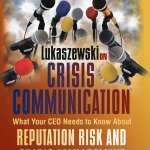The Boss’ Most Crucial Roles in Crisis
by Jim Lukaszewski
Few problems are crises. But all crises are serious management problems. Preplanning executive actions can avoid career-defining moments. Include specific executive expectation instructions in all plans and response scenarios.
One of the more powerful weaknesses in crisis response is the lack of specific roles and assignments for top management. The result of this crucial gap in crisis management planning is the mismanagement, lack of management, or paralysis that afflicts crisis response efforts. This defect occurs all too frequently in plans I review, responses I analyze, and scenarios I explore with client companies.
In the course of directing a client’s crisis response, analyzing past responses to crisis, or developing powerful response strategies, it’s clear to me that crisis response promptness and effectiveness depends on having essential responsibilities spelled out carefully in your crisis plans for the CEO (or surviving leaders):
- Assert the moral authority expected of ethical leadership. No matter how devastating or catastrophic the crisis is, in most cultures’ forgiveness is possible provided the organization, through its early behaviors and leadership, takes appropriate and expected steps to learn from and deal with the issues. The behaviors, briefly and in order, are:
-
- Candor and disclosure (acknowledgment that something adverse has happened or is happening) Share response strategy.
- Explanation and revelation about the nature of the problem (some early analysis)
- Commitment to communicate throughout the process (even if there are lots of critics)
- Empathy (intentional acts of helpfulness, kindness, and compassion)
- Oversight (inviting outsiders, even victims, to look over your shoulders)
- Commitment to zero (finding ways to prevent similar events from occurring again)
- Restitution or penance (paying the price – generally doing more than would be expected, asked for, or required)
+++++++++++++++++++++++++++++++++++++++++++++++++++++++
Jim Lukaszewski is the author of Lukaszewski on Crisis Communication: What Your CEO Needs to Know About Reputation Risk and Crisis Management.
In this industry-defining book on crisis communication and leadership recovery, Jim Lukaszewski jump-starts the discussion by clearly differentiating a crisis from other business interruption events and introduces a concept rarely dealt with in crisis communication and operational response planning: managing the victim dimension of crisis.
 James E. Lukaszewski, ABC, APR, Fellow PRSA, teaches you exactly what to do, what to say, when to say it, and when to do it while the whole world is watching: stop creating victims; communicate effectively with all stakeholders; prevent lawsuits; and reduce the negative impact of media hounds and activists. All are supported by case studies and real-life examples, by trusted advisors to CEOs and practitioner/trainers named among the 100 Top Thought Leaders of 2013 by Trust Across America; profiled in Living Legends of American Public Relations; listed in Corporate Legal Times as one of “28 Experts to Call When All Hell Breaks Loose.”
James E. Lukaszewski, ABC, APR, Fellow PRSA, teaches you exactly what to do, what to say, when to say it, and when to do it while the whole world is watching: stop creating victims; communicate effectively with all stakeholders; prevent lawsuits; and reduce the negative impact of media hounds and activists. All are supported by case studies and real-life examples, by trusted advisors to CEOs and practitioner/trainers named among the 100 Top Thought Leaders of 2013 by Trust Across America; profiled in Living Legends of American Public Relations; listed in Corporate Legal Times as one of “28 Experts to Call When All Hell Breaks Loose.”
Lukaszewski’s book should be compulsory reading for leaders, aspiring leaders, and students of the business game.” ~ Steve Harrison, Non-Executive Chairman, Lee Hecht Harrison
Lukaszewski is also co-author of the new book, The Decency Code: The Leader’s Path to Building Integrity and Trust.
